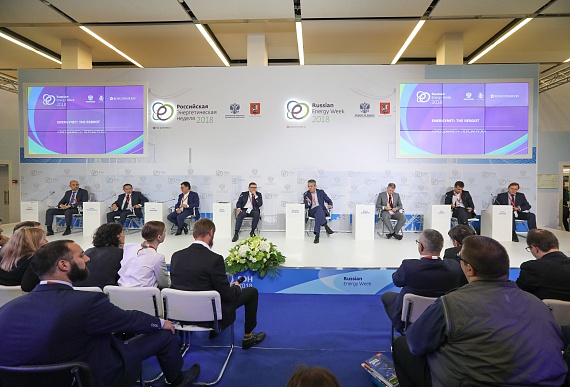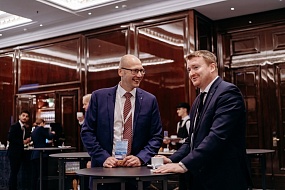EnergyNet: The Reboot

KEY CONCLUSIONS
EnergyNet is a roadmap for the technological transformation of the electrical energy sector
“The main objective of the EnergyNet National Technology Initiative is a word that’s popular at the moment – ‘transformation’. Any technological changes in the real world have next-level consequences. And these consequences are, ultimately, economic and socioeconomic. The past two years have allowed us to see how technology has suddenly become perpendicular to action. In other words, it doesn’t mesh with the status quo in the energy sector, suddenly it’s posing a threat to traditional businesses and demands particular attention. On this note, EnergyNet has proven itself to be the most independent, transparent programme, free of regulations or lobbying, unlike any other platform in the industry”, — Oleg Grinko, Working Group Co-Head, EnergyNet NTI
“Road maps aren’t about the technologies themselves, they’re about changing our consciousness in the most abstract sense of the word, and it’s clear that all of these technologies are truly affecting business models,” Alexey Texler, First Deputy Minister of Energy of the Russian Federation.
“Everything that we had been putting into the EnergyNet roadmap two years ago had seemed so strange then, but now it’s being discussed at very respectable scientific conferences by heads of government companies,” Dmitry Kholkin, Head of Project Center for Innovation Development, Strategic Research Center Foundation; Deputy Head of the Working Group, EnergyNet National Technology Initiative.
EnergyNet allows for integrated solutions for the electrical energy sector
“Including companies like RusHydro and Rosenergoatom in the work of EnergyNet will positively affect its work. Colleagues won’t just be looking at how to internally balance or compensate for changes, but how to use new technologies, technologies of the future, to solve the issues in integrated projects,” Oleg Dubnov, Vice President, Executive Director, Cluster of Energy Efficient Technologies, Skolkovo Foundation.
Large energy companies are actively participating in EnergyNet’s work
“Rosseti has enthusiastically participated in EnergyNet’s work from the moment it was created to today, and we are trying to formulate an innovative future development strategy. For us, EnergyNet is a vital platform where we face challenges, where we, as an electrical energy company, must adapt. That is why we are ready to become a launch pad for the implementation of new integrated pilot projects,” Evgeniy Olkhovich, Deputy General Director for Strategic Development, Rosseti.
Russia is creating a market for managing demand
“If we can figure out how to manage demand, then we can definitely increase the efficiency of our energy system by dozens of percentage points,” Alexey Texler, First Deputy Minister of Energy of the Russian Federation.
“Next year, for the first time in its experience, Russia will launch an energy demand management market. This is more than 700 MW of controlled load, which is approximately 650 thousand roubles of potential revenue for 1 MW of controlled load per month. These figures are attractive to most companies,” Dmitry Kholkin, Head of Project Center for Innovation Development, Strategic Research Center Foundation; Deputy Head of the Working Group, EnergyNet National Technology Initiative.
PROBLEMS
Insufficient standards
“De facto, all of these correct aims, which everyone supports, are practically impossible to implement, because our standards system makes it physically impossible to do so,” Alexey Texler, First Deputy Minister of Energy of the Russian Federation.
“Integration is still butting up against the demands of federal legislation. <...> The bar needs to be set higher. We need to start questioning, and this is perfectly normal within EnergyNet, the founding principles of the formation and regulation of Russia’s current energy markets,” Evgeniy Olkhovich, Deputy General Director for Strategic Development, Rosseti.
“There isn’t a single initiative that allows us to see which direction our standards must change. This isn’t being discussed on the political level,” Leonid Neganov, Minister of Energy of Moscow Region.
“The majority of the terminology, colleagues, that you use aren’t fixed in legislation. Even the elementary term ‘smart tracking system’ can’t be found in current legislation,” Valery Seleznev, First Deputy Chairman of the Committee on Energy, The State Duma of the Federal Assembly of the Russian Federation.
Stimuli for transforming the Russian energy sector are lacking
“Any significant changes in the market must first be provoked by some sort of challenges. It’s very hard to find energy supply reliability [challenges] in the Russian electrical energy landscape,” Evgeniy Olkhovich, Deputy General Director for Strategic Development, Rosseti.
SOLUTIONS
Stimulating businesses’ interest in implementing new technologies
“Technologies are needed when business practices demand them. Existing business practices and existing companies are very conservative in their implementation of new technologies, because their business doesn’t demand that of them. We need to see businesses that need these new technologies appear,” Dmitry Kholkin, Head of Project Center for Innovation Development, Strategic Research Center Foundation; Deputy Head of the Working Group, EnergyNet National Technology Initiative.
Making comprehensive, integrated solutions
“The regulatory map plays a simple role – it leads the way and launches new business practices through pilot projects. Thanks to the NTI, we’ve been able to launch very important work related to the development of a new energy architecture. This is a fundamentally vital question, because we don’t need individual technical solutions, we need comprehensive, integrated business solutions,” Dmitry Kholkin, Head of Project Center for Innovation Development, Strategic Research Center Foundation; Deputy Head of the Working Group, EnergyNet National Technology Initiative.
“I hope that EnergyNet will be the first map, that won’t be for making situational decisions, that we’ll support this set of projects, which aren’t interrelated and don’t affect the system. It would be great to apply the roadmap to those problems that appear when we start refining our projects,” Alexander Povalko, Chief Executive Officer, Chairman of the Management Board, RVC
Preparing the electrical grid for transformation
“The transformation is inevitable and the electrical grid must be ready for this change at a minimum baseline level,” Evgeniy Olkhovich, Deputy General Director for Strategic Development, Rosseti.
Finding sources of financing for technology integration
“Whenever we talk about implementation, we should always get a handle on our sources as our first step. We can do anything, but first, we have to have the resources for it,” Aleksey Kolodeznikov, First Deputy Chairman of the Government of the Republic of Sakha (Yakutia).




